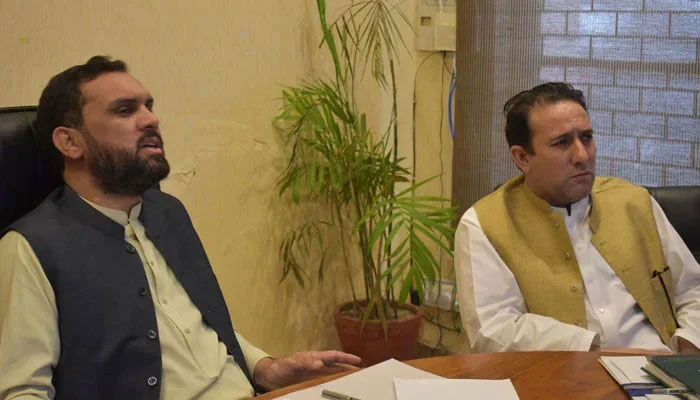KP govt to introduce market-oriented subjects in higher education
Provincial government was mulling over a policy to introduce modern and market-oriented subjects in higher educational institutions: Minister
PESHAWAR: The Khyber Pakhtunkhwa Assembly was told on Tuesday that instead of promoting outdated and traditional subjects, the provincial government would introduce market-oriented ones at the college and university levels.
In response to a call attention notice, Minister for Higher Education Meena Khan Afridi said the provincial government was mulling over a policy to introduce modern and market-oriented subjects in higher educational institutions. For this purpose, he added, highly professional people would be appointed as teaching staff.
“The old and outdated subjects would gradually be wrapped up in the colleges and universities while no more teaching staff for such subjects would be acquired in the near future,” he said and added that new higher education policy would be announced soon in the province.
In his call attention notice, the Jamiat Ulema-e-Islam-F Member Provincial Assembly Adnan Khan Wazir drew the attention of the government towards delay in the appointment of lecturers for different subjects. He said that the Higher Education Department had advertised vacant posts through the Provincial Public Service Commission in May 2022 for which hundreds of educated youths had applied but only vacant posts for computer science and political science were filled while appointments for the rest of the subjects were either stopped or delayed.
The mover said that posts were created by the previous Pakistan Tehreek-e-Insaf-led government and now the present government must fill out all these positions or else the candidates would have no other option but to move courts or staging protests.
In another call attention notice, the treasury benches MPA Ikramullah said Minerals Investment Facilitation Authority, a regulatory authority for mines and minerals, had raised the royalty rates on mines to 13 percent without consulting the stakeholders, adding such a heavy raise would be a burden on small-scale leaseholders in the province. He asked the provincial government to lower the royalty rates on the lease of mines as out of 3900 leases only 600 were operative in the province.
Minister for Law Aftab Alam told the House that an amendment bill to reduce the rates and taxes on mines and minerals would be tabled in the House and the provincial government would soon evolve a comprehensive policy for mines and minerals in the province. An amendment bill for reducing royalty rates on metallic minerals, fuel minerals, precious and semi-precious gemstones and constructive and industrial mineral group was also tabled in the provincial assembly. It suggested a cut in the royalty rates in different categories of minerals. The bill is named as the Khyber Pakhtunkhwa Mines and Minerals (Second Amendment) Act 2024. The present provincial government also revised its tobacco development Cess introduced in the current annual budget by suggesting amendments to the Khyber Pakhtunkhwa Finance Act that will reduce cess on the transportation of different categories of tobacco in the province. Under the Khyber Pakhtunkhwa Finance (Amendment) Act, 2024, the rates of Virginia tobacco (flue-cured, barely and dark-air cured has been reduced from Rs 50 per kilogram to Rs 25 per kilogram with 10 percent annual increase.
For white Patta/Rustica tobacco, including Khaka, Khara, and Rorh made of main stalks and stem tobacco would now be at Rs 15 per kilogram with a 10 percent annual increase while for the Snuff Rs 7.5 per kilogram or 03 percent of the invoice value or whichever is high will be fixed under the new bill. The session was adjourned till Friday afternoon, August 2.
-
 Breaking: 2 Dead Several Injured In South Carolina State University Shooting
Breaking: 2 Dead Several Injured In South Carolina State University Shooting -
 China Debuts World’s First AI-powered Earth Observation Satellite For Smart Cities
China Debuts World’s First AI-powered Earth Observation Satellite For Smart Cities -
 Royal Family Desperate To Push Andrew As Far Away As Possible: Expert
Royal Family Desperate To Push Andrew As Far Away As Possible: Expert -
 Cruz Beckham Releases New Romantic Track 'For Your Love'
Cruz Beckham Releases New Romantic Track 'For Your Love' -
 5 Celebrities You Didn't Know Have Experienced Depression
5 Celebrities You Didn't Know Have Experienced Depression -
 Trump Considers Scaling Back Trade Levies On Steel, Aluminium In Response To Rising Costs
Trump Considers Scaling Back Trade Levies On Steel, Aluminium In Response To Rising Costs -
 Claude AI Shutdown Simulation Sparks Fresh AI Safety Concerns
Claude AI Shutdown Simulation Sparks Fresh AI Safety Concerns -
 King Charles Vows Not To Let Andrew Scandal Overshadow His Special Project
King Charles Vows Not To Let Andrew Scandal Overshadow His Special Project -
 Spotify Says Its Best Engineers No Longer Write Code As AI Takes Over
Spotify Says Its Best Engineers No Longer Write Code As AI Takes Over -
 Michelle Yeoh Addresses 'Wicked For Good' Snub At 2026 Oscars
Michelle Yeoh Addresses 'Wicked For Good' Snub At 2026 Oscars -
 Trump Revokes Legal Basis For US Climate Regulation, Curb Vehicle Emission Standards
Trump Revokes Legal Basis For US Climate Regulation, Curb Vehicle Emission Standards -
 DOJ Blocks Trump Administration From Cutting $600M In Public Health Funds
DOJ Blocks Trump Administration From Cutting $600M In Public Health Funds -
 2026 Winter Olympics Men Figure Skating: Malinin Eyes Quadruple Axel, After Banned Backflip
2026 Winter Olympics Men Figure Skating: Malinin Eyes Quadruple Axel, After Banned Backflip -
 Meghan Markle Rallies Behind Brooklyn Beckham Amid Explosive Family Drama
Meghan Markle Rallies Behind Brooklyn Beckham Amid Explosive Family Drama -
 Scientists Find Strange Solar System That Breaks Planet Formation Rules
Scientists Find Strange Solar System That Breaks Planet Formation Rules -
 Backstreet Boys Voice Desire To Headline 2027's Super Bowl Halftime Show
Backstreet Boys Voice Desire To Headline 2027's Super Bowl Halftime Show




